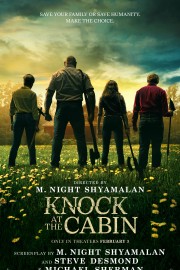Knock at the Cabin
M. Night Shyamalan’s films have always had some wild religious contexts in them. Part of that is because the nature of faith is at the center of most of his films. Not just something as overt as “Signs” or “The Village” but even “The Visit” and “Unbreakable” deal in ideas of people thrust into situations where a leap of faith or- in the case of “The Visit”- trying to escape forced conversion is necessary. I say this because some of the ideas behind the larger story of “Knock of the Cabin” seem to be taking viewers by surprise. They shouldn’t be, though- this is ultimately who Shyamalan has always been.
For the third time in his career as a director, he is adapting someone else’s material- the first two times were “The Last Airbender” and “Old”- and I feel like he is better suited for the novel by Paul G. Tremblay than he was the anime sensation, and maybe even the graphic novel that became “Old.” From what I’ve read of an outline of the book- and what we see on the screen- this fits much stronger with the ideas Shyamalan likes to explore, and in a genre he is comfortable with. The script by Shyamalan, Steve Desmond and Michael Sherman, unfortunately, only scratches the surface of those ideas, and leaves a lot of depth and potential untapped.
In a remote cabin, Eric (Jonathan Groff) and Andrew (Ben Aldridge) are on a trip with their adopted daughter, Wen (Kristen Cui). She is outside looking for grasshoppers one day when a stranger walks up. The man, Leonard (Dave Bautista), introduces himself, and says that he and his friends have been destined to meet them, at this moment, as the fate of humanity is at stake.
One of the things I love about “Knock at the Cabin” is Shyamalan’s use of close-ups and framing with cinematographer Jarin Biaschke. The film’s setting is intended to be isolating and claustrophobic, to a large degree, and it is. Even as his scripts have become more uneven over the years, one cannot question that, as a visual storyteller, his films are always interesting. As are the performances he gets from his cast. Bautista is the clear standout, but everyone- including Rupert Grint, Nikki Amuka-Bird and Abby Quinn as the other visitors to the cabin- has terrific moments as the film plays out. I think Cui is the other highlight, and Groff and Aldridge make an affecting pair. All of the characters are simply defined.
One of the problems with much of Shyamalan’s work, in my opinion, since “The Village” has been his ability to pull off the “big move” that seems to put everything we’ve seen before into context. It’s not about a twist, but a revealing of the mechanics of the larger world. I’m not sure how much of it was in Tremblay’s book, but the way the film plays out, it cannot seem to make up its mind how honestly it wants to play to that big move. Much was changed from the novel, based on the summary I read, and I think some of the changes mostly work- and I really love the structure of how information is delivered in this film- but the notion of whether the four guests are being honest or lying is never fully played to its logical conclusion. If one thing was a lie, and everything else is true, what was the point of uncovering the lie? A surprising film this reminded me of was Alex Proyas’s “Knowing,” which also used visions and premonitions to build an apocalyptic narrative. That one went all the way to its natural conclusion, though, and didn’t seem afraid to be a downer. “Knock at the Cabin” is afraid to pull the trigger on that. Even having said that, though, Shyamalan had me engaged the entire time. It’s messy and doesn’t always work, but I was on board the entire way. That he doesn’t leave any fat on his films- this one is a lean 100 minutes- is a big part of that here.










